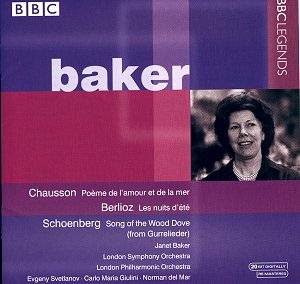Janet Baker excelled in French music, her Dido in The
Trojans at Scottish Opera and at the Royal Opera House remain firmly
etched in the memory of those who heard her. The colour, timbres and
subtle shades she brings to the works on this disc are uncanny. The
performances are spellbinding and in turn she seems to fire both Svetlanov
and Giulini to conduct either with restraint or with unbridled passion
when their respective orchestras are let off the leash. Baker has a
wonderful floating quality to her pianissimo. The thread of sound is
always distinct, and above all she communicates, not just in terms of
the text (and no one could fault either her French or German) but in
her breadth of vocal colour. The end of ‘Le spectre de la rose’
is utterly gripping after a wonderfully eloquent performance (which
has been issued before) of Chausson’s Poème de l’amour et
de la mer, that most neo-Wagnerian of French works, in which Svetlanov
takes extreme care to balance it all. Giulini in the Berlioz lingers
much but Baker rises to the challenge and is perfectly capable of sustaining
the long-breathed lines to which he commits her. It is a highly romantic
account but beautifully judged with the LPO in particularly fine form
especially in the lustrous wind chords of ‘Absence’. It’s no quantum
leap from Chausson to this particular Schoenberg work. His is a name
that still tends to put people off and conjures up preconceptions of
atonalism and discords. Not a bit of it. This is pure Wagnerian drama
once again, dating from the first decade of the 20th century
and recorded in 1963. It is directed by the largely underrated but hugely
erudite Norman Del Mar. This was well before Boulez took on the BBCSO
and opened up the doors and windows of this music of the 1920s to the
1950s allowing audiences to become more acquainted with the Second Viennese
School composers headed by Schoenberg. It’s a wonderful work, and this
extract stretches Baker’s voice at both ends, a challenge to which she
rises consummately. An excellent recording, with applause only at the
end of the ‘Song of the Wood Dove’, so that the breathless atmospheres
established at the end of the Chausson and Berlioz works are not rudely
shattered by such a mundane sound as clapping. A welcome further addition
from the archival treasure trove being plundered by the Beeb. Buy while
stocks last.
Christopher Fifield
|

![]() Janet Baker (mezzo
soprano)
Janet Baker (mezzo
soprano) ![]() BBC LEGENDS
SERIES BBCL 4077-2 [75.15]
BBC LEGENDS
SERIES BBCL 4077-2 [75.15]